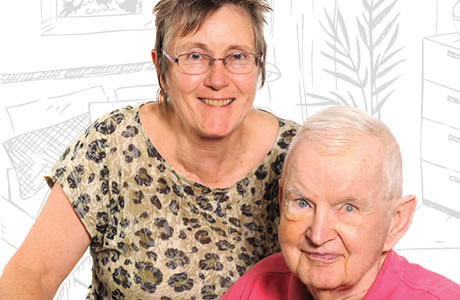Stewart Moran, 91, has a sweet temperament, a head full of white hair, and a smile that can light up the room. He likes watching British sitcoms and is amiable with the staff at Sunrise Assisted Living in Decatur, Ga., where he lives.
But the one thing that could put Moran in a black mood was a visit to the doctor. “As he declined, it became overwhelmingly impossible to get him to the clinic,” says his daughter, Nancy Yang. “By the time we got him there, he was so physically and emotionally drained that he’d be undone.”
That’s when Nancy and her husband, Emory primary care physician Bill Yang, decided to ask a favor of Emory geriatrician Louise Horney. She had been the doctor of Bill’s father, who also had lived at Sunrise. Could she come to the patient? Horney agreed, and during her visit, she uncovered a key to improving Moran’s health. His orders were written for medications to be administered at bedtime, which at Sunrise occurred routinely at 9 pm. But Moran went to bed around 8 pm each evening. When he was awakened an hour later, he’d just roll over and go back to sleep. The chart was marked as “meds refused.” Horney changed the order to 5 pm, and the problem was solved. Once Moran was back on his medications, he allowed his blood to be drawn.
“It wasn’t rocket science, but it’s a good example of what we knew already,” she says. “It makes sense for us to go to them.”
That visit in 2008 became the inspiration for a new domiciliary care program that Horney helped launch in 2010 on completion of a Fulbright in Turkey. The program brings Emory health care professionals to patients rather than the other way around. For more than a year now, Horney and her colleagues—geriatrician Candace Cato and geriatric nurse practitioner Karolina Graber—have been making the rounds at 11 assisted-living facilities throughout metro Atlanta. Among the three of them, they see about 200 patients each year in this outreach program of the Emory Clinic.

